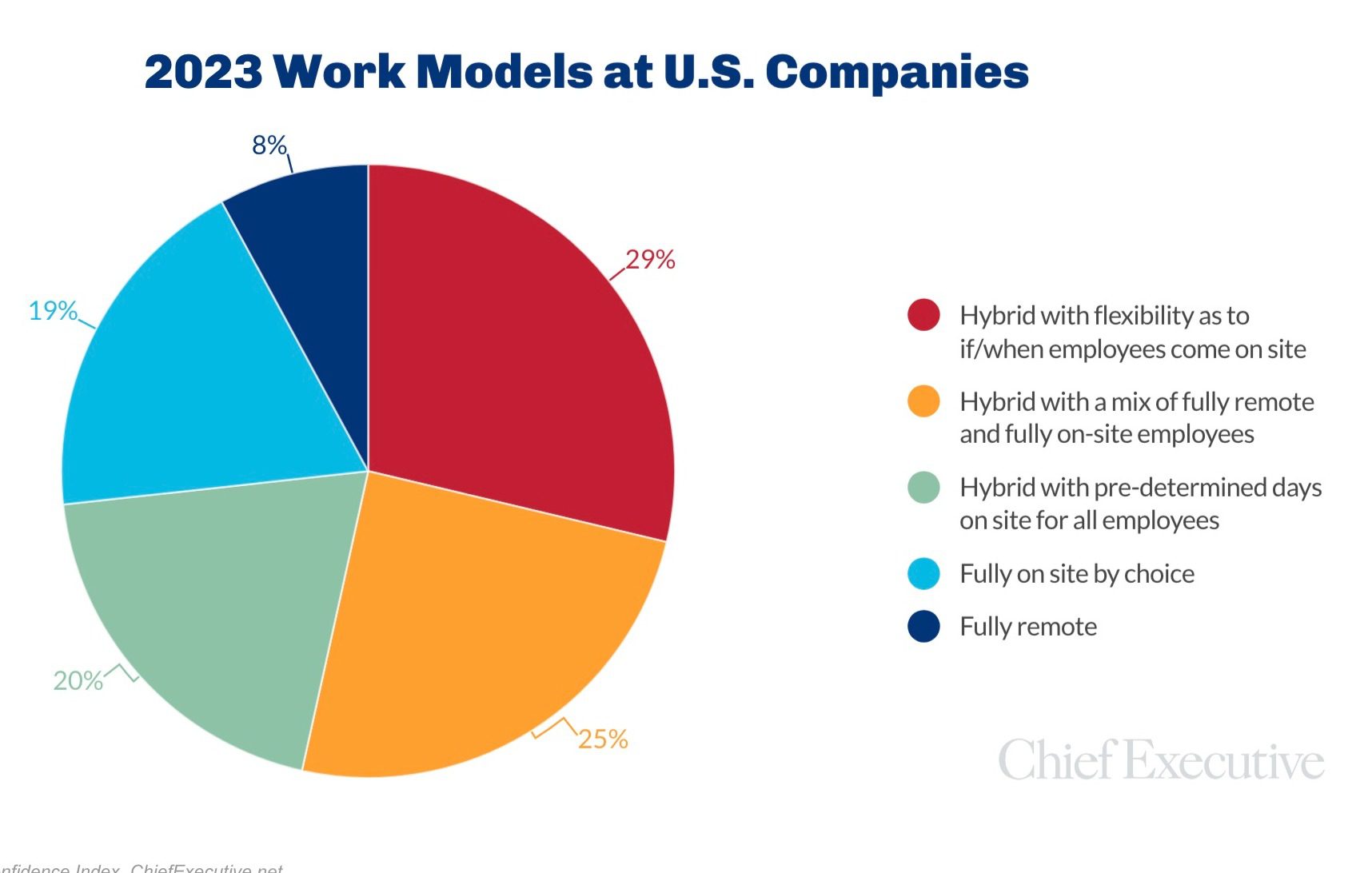The data comes as somewhat of a surprise because when we asked CEOs to share whether they were satisfied with their chosen model in 2022, 60 percent of those that had a remote or hybrid model in place said yes. A negligible half percent said they were planning to go back to in-person work after the pandemic.
And according to our 2023 survey, only 5 percent of companies operating in a remote or hybrid manner said performance had declined as a result. So, what happened?
“It kills innovation,” said the CEO of a small tech company who reported negative results as part of the remote experiment.
A CEO in the engineering space said that while providing flexibility makes it easier to attract and keep talent, it is also more work for leadership at all levels of the organization, with a greater need to be deliberate in communications, work sharing and relationship development.
But perhaps a bigger contributor to the return to the office has been a weaker culture, as CEOs say they struggle to get the same level of engagement and involvement from their remote employees.
“We’ve extended remote work flexibility to some of our office staff, and while they get their work done timely, it is difficult and sometimes frustrating to get them involved in team projects, instantaneous ideation, etc.,” said Don Ochsenreiter, president and CEO of Dollamur Sport Surfaces, a sporting goods store in Fort Worth, Texas.
Ochsenreiter’s situation is one many other CEOs find themselves in: where some employees enjoy the flexibility of remote work while others must be on-site to get the job done. “We have a factory where attendance is mandatory,” said Rahul Parikh, president of MultiTech Industries, a manufacturer of electronics components based in New Jersey. “But office workers are on hybrid schedule, creating some morale issues.”
One advertising CEO said the company only allows fully remote work for a handful of long-time employees in special circumstances. Others are required in the office at least a few times a week. “We continue to see utilization and realization rate impacts. We are retaining less of each dollar, but the team is seemingly working more hours, so the hybrid model contributes to the team feeling like they need to put more hours in but with less productive outcomes,” the CEO said. “It remains to be seen whether or not we will continue this model indefinitely.”
“It’s much harder to build company culture when you are fully remote,” agreed Xana Winans, CEO of Golden Proportions Marketing, a marketing agency in Milton, Pennsylvania. But, she said, “I have access to talent around the country that I simply could not get where the company is based.”
And that, perhaps, is one of the greatest areas of opportunity for companies today. The question is, how do you make the rest work for all facets of the operations.
“Without becoming a sort of Big Brother, we’d like to have a better track of our activities conducted remotely,” said Massimo Toso, president and CEO of Buzzi Unicem, a cement manufacturing company in Bethlehem, Pennsylvania.
Dean Lee, president and CEO of 3HC Home Health and Hospice Care, said his company has seen improved staff satisfaction and productivity with going hybrid with flexibility as to if/when employees come on site. He is very satisfied with the outcome, but like many, he says “the challenges are with maintaining connectivity/relationships with team members.”
To address these challenges and help CEOs make hybrid and remote work work, Chief Executive will be holding two events:
1. Making Hybrid Work Great, in collaboration with Steelcase, will showcase emerging best practices for hybrid work in a unique in-person day of learning for CEOs, CHROs, CFOs and CIOs contending with new workplace strategies, implications of evolving employee expectations and competition for talent. Speakers include Stephen M.R. Covey, bestselling author, Trust & Inspire and The Speed of Trust; Lynne Borthwick, global talent leader, Thrasio; April Hicks, head of global talent acquisition and people strategy & enablement, Bank of America; and many others. Join us April 27.
2. The Remote Work Future: A virtual conference that will bring together leaders of remote work organizations and thought leaders to share best practices on fostering innovation and collaboration, effective goal setting and individual coaching that gets results when your employees aren’t in one building and identifying solutions to common cultural challenges. Join us May 2.
About the CEO Confidence Index
The CEO Confidence Index is America’s largest monthly survey of chief executives. Each month, Chief Executive surveys CEOs across America, at organizations of all types and sizes, to compile our CEO Confidence Index data. The Index tracks confidence in current and future business environments, based on CEOs’ observations of various economic and business components. For additional information about the Index and prior months data, visit ChiefExecutive.net/category/CEO-Confidence-Index/
